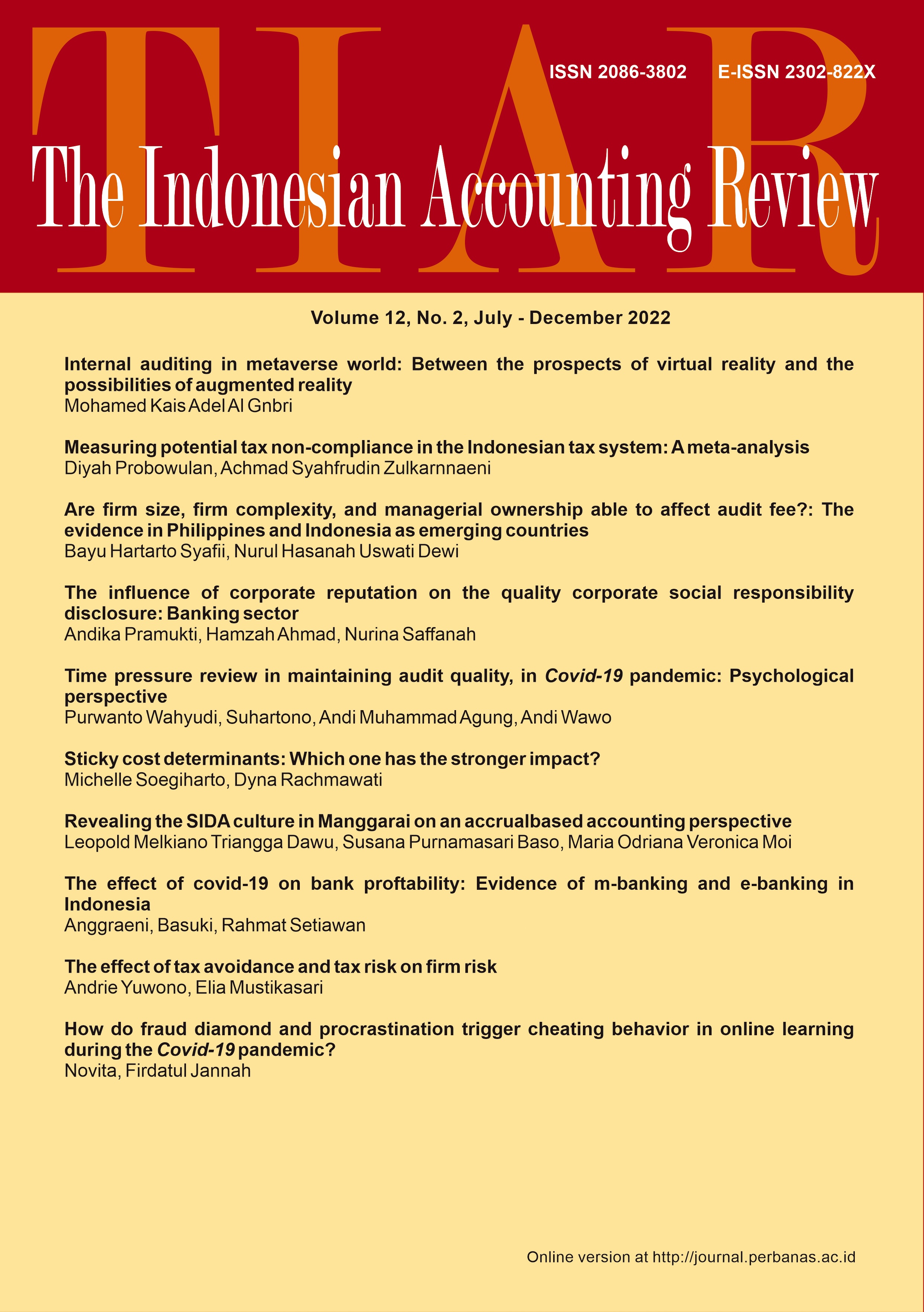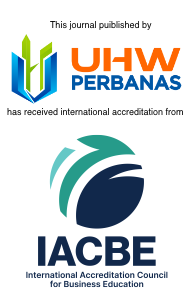The influence of corporate reputation on the quality corporate social responsibility disclosure: Banking sector
DOI:
https://doi.org/10.14414/tiar.v12i2.2901Keywords:
Corporate social responsibility dis-closure, Reputatuion company, In-donesia sustainability reporting awards, Sustainability reportAbstract
This study is aimed to examine the effect of reputation toward the quality of corporate social responsibility disclosure. This study applied an index based on the qualitative characteristics of the International Financial Reporting Standard Conceptual Framework. In addition, the study is modified with  a measured variable of the Quality of Corporate Social responsibility Disclosure. Furthermore, this study used purposive judgment sampling and 13 relevant financial sector companies were obtained. The result indicates that company reputation has positive relationship with the quality of CSR disclosure, but it is insignificant. In addition, this study indicates that the relevant dimension has not been highlighted compared to other dimensions such as loyal representation, understanding, and Comparability. CSR disclosures prioritize quality in order to be credible communication tool for the users.
References
Ahmed Haji, A. (2013). Corporate social responsibility disclosures over time: evidence from Malaysia. Managerial Auditing Journal, 28(7), 647–676. https://doi.org/10.1108/MAJ-07-2012-0729
Aliada, R. A., Herwiyanti, E., & S, K. (2019). Peran Mediasi Reputasi Pada Hubungan Pengungkapan Csr. 23(1), 49–64.
Arli, D., van Esch, P., Northey, G., Lee, M. S. W., & Dimitriu, R. (2019). Hypocrisy, skepticism, and reputation: the mediating role of corporate social responsibility. Marketing Intelligence and Planning, 37(6), 706–720. https://doi.org/10.1108/MIP-10-2018-0434
Bachoo, K., Tan, R., & Wilson, M. (2013). Firm Value and the Quality of Sustainability Reporting in Australia. Australian Accounting Review, 23(1), 67–87. https://doi.org/10.1111/j.1835-2561.2012.00187.x
Barnea, A., & Rubin, A. (2010). Corporate Social Responsibility as a Conflict Between Shareholders. Journal of Business Ethics, 97(1), 71–86. https://doi.org/10.1007/s10551-010-0496-z
Bona-sánchez, C., Pérez-alemán, J., & Santana-martin, D. J. (2017). Research in International Business and Finance Sustainability disclosure , dominant owners and earnings informativeness. Research in International Business and Finance, 39, 625–639. https://doi.org/10.1016/j.ribaf.2016.07.020
Bramasta, F. A. (n.d.). Corporate Social Responsibility (Csr) Untuk Pengelolaan Citra Dan Reputasi Perusahaan Rokok Di Indonesia. Academia.Edu. https://www.academia.edu/download/66062665/_Jurnal_CSR_Perusahaan_Rokok_di_Indonesia_Bramasta.pdf
Branco, M. C., & Rodrigues, L. L. (2006). Corporate social responsibility and resource-based perspectives. Journal of Business Ethics, 69(2), 111–132. https://doi.org/10.1007/s10551-006-9071-z
Buallay, A. (2019). Is sustainability reporting (ESG) associated with performance? Evidence from the European banking sector. Management of Environmental Quality: An International Journal, 30(1), 98–115. https://doi.org/10.1108/MEQ-12-2017-0149/FULL/HTML
Ching, H. Y., Gerab, F., & Toste, T. H. (2017). The Quality of Sustainability Reports and Corporate Financial Performance: Evidence From Brazilian Listed Companies. SAGE Open, 7(2). https://doi.org/10.1177/2158244017712027
Cohen, D. A. (2002). Financial Reporting Quality and Proprietary Costs.
Cohen, J., & Holder-webb, L. (2011). Retail Investors’ Perceptions of the Decision-Usefulness of Economic Performance, Governance, and Corporate Social Responsibility Disclosures. 23(1), 109–129. https://doi.org/10.2308/bria.2011.23.1.109
Cormier, D., & Gordon, I. M. (2001). An examination of social and environmental reporting strategies. Accounting, Auditing & Accountability Journal, 14(5), 587–617. https://doi.org/10.1108/EUM0000000006264
Deegan, C. (2002). Introduction: The legitimising effect of social and environmental disclosures – a theoretical foundation. Accounting, Auditing & Accountability Journal, 15(3), 282–311. https://doi.org/10.1108/09513570210435852
Dewi, V. I. (2012). SOCIALLY RESPONSIBLE INVESTMENT SEBAGAI MOTIF PENERAPAN SUSTAINABLE CORPORATE SOCIAL RESPONSIBILITY. 16, 24–34.
El Ghoul, S., Guedhami, O., & Kim, Y. (2017). Country-level institutions, firm value, and the role of corporate social responsibility initiatives. Journal of International Business Studies, 48(3), 360–385. https://doi.org/10.1057/jibs.2016.4
Etzion, D., & Ferraro, F. (2010). The role of analogy in the institutionalization of sustainability reporting. Organization Science, 21(5), 1092–1107. https://doi.org/10.1287/orsc.1090.0494
Fathi, J. (2013). Corporate governance system and quality of financial information. Mediterranean Journal of Social Sciences, 4(2), 129–142. https://doi.org/10.5901/mjss.2013.v4n2p129
Gallén, M. L., & Peraita, C. (2017). The Relationship between Femininity and Sustainability Reporting. Corporate Social Responsibility and Environmental Management, 24(6), 496–508. https://doi.org/10.1002/csr.1423
Ganesan, Y., Hwa, Y. W., Jaaffar, A. H., & Hashim, F. (2017). Corporate Governance and Sustainability Reporting Practices: The Moderating Role of Internal Audit Function. Global Business & Management Research, 9(4), 159–179. http://search.ebscohost.com/login.aspx?direct=true&db=ent&AN=127011679&site=ehost-live
Gistri, G., Corciolani, M., & Pace, S. (2019). Does the perception of incongruence hurt more? Customers’ responses to CSR crises affecting the main reputation dimension of a company. Https://Doi.Org/10.1080/0267257X.2019.1580761, 35(7–8), 605–633. https://doi.org/10.1080/0267257X.2019.1580761
Global Reporting Initiative. (2016). GRI G4 Standard.
Hall, R. (1992). The strategic analysis of intangible resources. Strategic Management Journal, 13(2), 135–144. https://doi.org/10.1002/smj.4250130205
Im, W. J., Youk, S., & Park, H. S. (2021). Apologies combined with other crisis response strategies: Do the fulfillment of individuals’ needs to be heard and the timing of response message affect apology appropriateness? Public Relations Review, 47(1), 102002. https://doi.org/10.1016/J.PUBREV.2020.102002
Lee Brown, D., Guidry, R. P., & Patten, D. M. (2009). Sustainability reporting and perceptions of corporate reputation: An analysis using fortune. 4(2010), 83–104. https://doi.org/10.1108/s1479-3598(2010)0000004007
Lourenço, I., Production, M. B.-J. of C., & 2013, undefined. (n.d.). Determinants of corporate sustainability performance in emerging markets: the Brazilian case. Elsevier.
McWilliams, A., & Siegel, D. S. (2011). Creating and capturing value: Strategic corporate social responsibility, resource-based theory, and sustainable competitive advantage. Journal of Management, 37(5), 1480–1495. https://doi.org/10.1177/0149206310385696
Michelon, G., Pilonato, S., Ricceri, F., & Roberts, R. W. (2016). Behind camouflaging: traditional and innovative theoretical perspectives. Sustainability Accounting, Management and Policy Journalics Management, 7(1), 2–25.
Munshi, D., & Dutta, S. (2016). Sustainability reporting quality of Indian and American manufacturing firms: A comparative analysis. Serbian Journal of Management, 11(2), 245–260. https://doi.org/10.5937/sjm11-9593
Nasution, R. M., & Adhariani, D. (2016). SIMBOLIS ATAU SUBSTANTIF? ANALISIS PRAKTIK PELAPORAN CSR DAN KUALITAS PENGUNGKAPAN. Jurnal Akuntansi Dan Keuangan Indonesia, 13(1), 23–51. https://doi.org/10.21002/jaki.2016.02
Nguyen, N. T. T., Nguyen, N. P., & Thanh Hoai, T. (2021). Ethical leadership, corporate social responsibility, firm reputation, and firm performance: A serial mediation model. Heliyon, 7(4), e06809. https://doi.org/10.1016/j.heliyon.2021.e06809
Pérez, A., & Lopez-Gutierrez, C. (2017). An empirical analysis of the relationship between the information quality of CSR reporting and reputation among publicly traded companies in Spain. Academia Revista Latinoamericana de Administración.
Permatasari, P., Gunawan, J., & El-Bannany, M. (2020). A Comprehensive Measurement for Sustainability Reporting Quality: Principles-Based Approach. Indonesian Journal of Sustainability Accounting and Management, 4(2), 249. https://doi.org/10.28992/ijsam.v4i2.282
Pope, S., & Wæraas, A. (2016). CSR-Washing is Rare: A Conceptual Framework, Literature Review, and Critique. Journal of Business Ethics, 137(1), 173–193. https://doi.org/10.1007/s10551-015-2546-z
Rokhlinasari S. (2015). Teori-Teori dalam Pengungkapan Informasi Corporate Social Responsibility Perbankan. Jurnal Kajian Ekonomi Dan Perbankan Syariah, 7, 1–11.
Ruiz, B., & GarcÃa, J. A. (2021). Analyzing the relationship between CSR and reputation in the banking sector. Journal of Retailing and Consumer Services, 61(February). https://doi.org/10.1016/j.jretconser.2021.102552
Sìmnett, R., Vanstraelen, A., & Chua, W. F. (2009). Assurance on sustainability reports: An international comparison. Accounting Review, 84(3), 937–967. https://doi.org/10.2308/accr.2009.84.3.937
Usman, B. (2020). CSR Reports, CSR Disclosure Quality, and Corporate Reputations: A Systematic Literature Review. Indonesian Journal of Sustainability Accounting and Management, 4(1), 28. https://doi.org/10.28992/ijsam.v4i1.166
Weigelt, K., & Camerer, C. (1988). Reputation and corporate strategy: A review of recent theory and applications. Strategic Management Journal, 9(5), 443–454. https://doi.org/10.1002/smj.4250090505
Downloads
Additional Files
Submitted
Published
How to Cite
Issue
Section
License
Copyright (c) 2022 The Indonesian Accounting Review

This work is licensed under a Creative Commons Attribution-NonCommercial 4.0 International License.

















